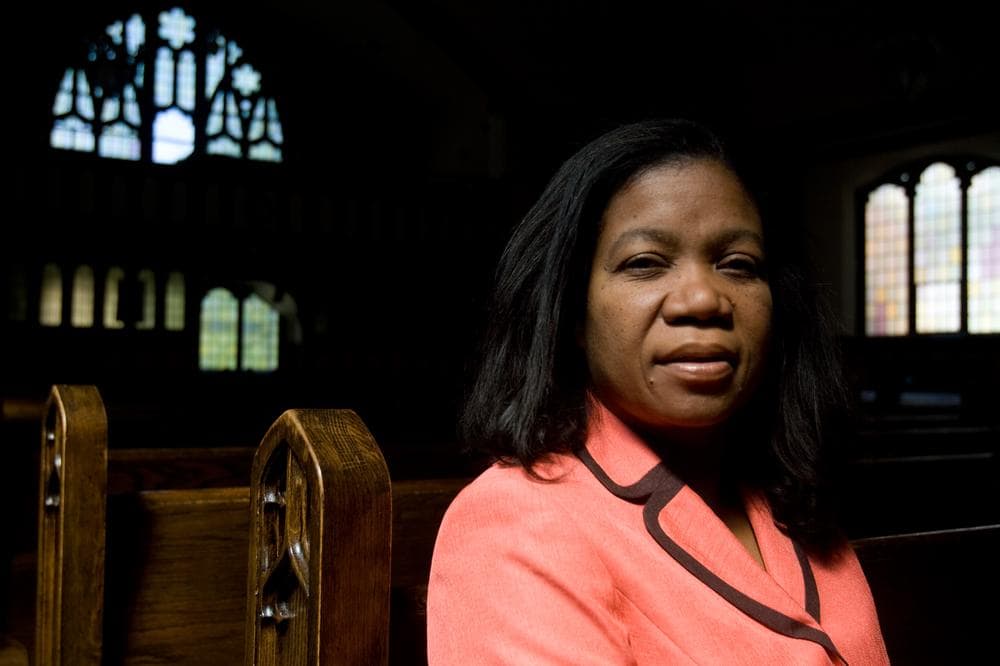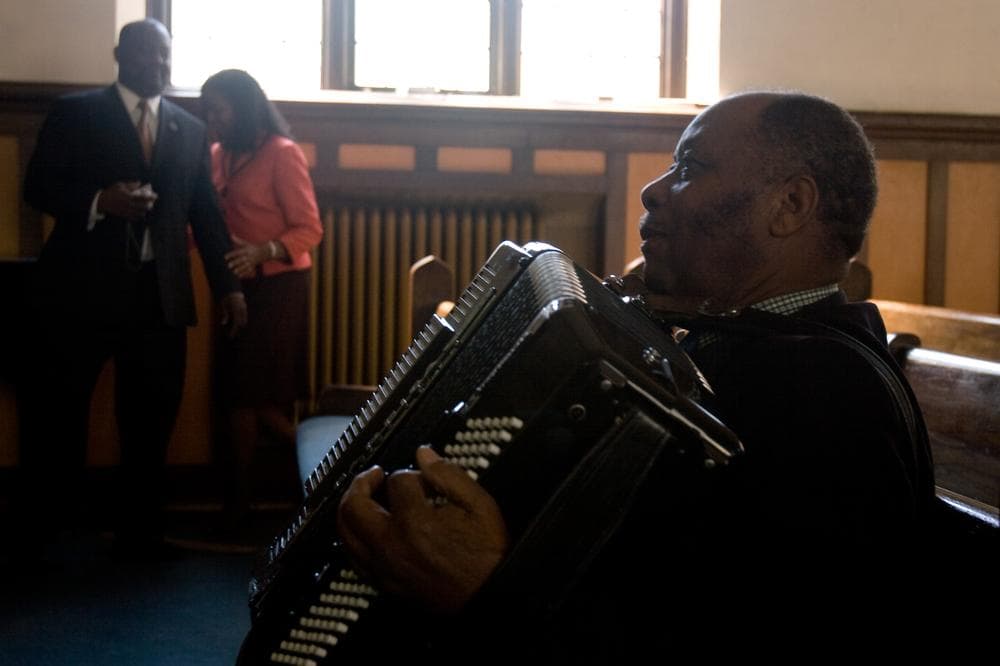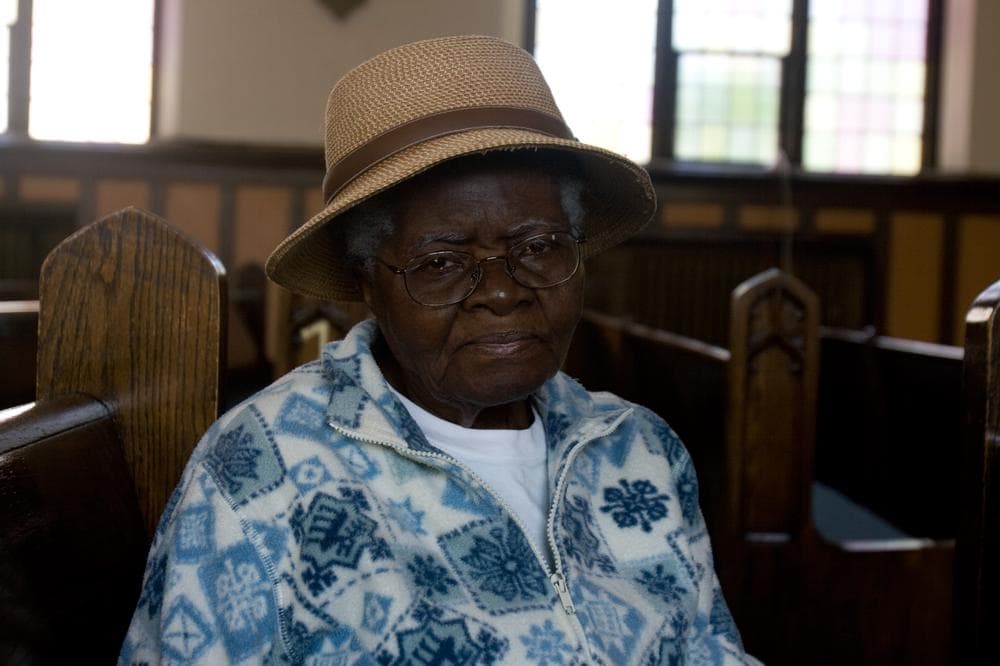Advertisement
Invisible Communities, Part 4: Haitians Say They're Haitian, Not African-American
ResumeIllegal immigration has gotten a lot of recent attention with the passage of Arizona’s controversial law. What often gets lost, however, is how immigration — legal and illegal — changes our country and our state. But few really know what goes on within these communities — to many, they are “invisible.” This is Part 4 of a WBUR series: Invisible Communities.

BOSTON — Rhode Milord LeBlanc teaches English as a second language at a Haitian nonprofit in Mattapan Square — the heart of Greater Boston's Haitian community. Her students are mostly Haitian, with a smattering of immigrants from the Dominican Republic.
"Some people like me, I'm Haitian-American," she says. "That means my family is from Haiti, but I was born here. I feel more Haitian than American because of the way I was raised."
Then she turns to her class of adults. "Do you feel that you're more Dominican or more American? Or more Haitian or more American?"
The students yell out their answers. The split in the room is remarkable. The Haitians have United States passports and have been here for years. But they say they are more Haitian than American. The Dominicans have been in the U.S. for less than a year, but they feel as American as Dominican.

LeBlanc and others say that for Haitians, this has everything to do with Haiti's unique language and formal customs inherited from the French, who colonized the country. But many researchers say there's something else going on.
"If you're in Haiti and you look at the black community here, what do you see? It's hip-hop," says Alix Cantave, the associate director of the Trotter Institute for the Study of Black Culture at the University of Massachusetts Boston.
"It's housing projects," Cantave says. "It's all these things, so that's the image they migrate with. It's the perception that it's everything not to do, in a way, between the adults. So you don't want your children to go and imitate African-American behavior."
Researchers like Cantave, and Christina Greer at Fordham University, argue that Haitians maintain their "Haitianness" because they think it will help them.
"Based on where they perceive black Americans and where black Americans perceive where they are on the fictitious totem pole, many Haitian immigrants choose to maintain their ethnic identity," Greer says. The political science professor is writing a book about how Caribbean and African immigrants are maintaining their ethnic identity in America.
So Haitians are trying to become visible by defining themselves as separate from African-Americans. Twenty-nine-year-old Jean Franck Fenelon makes no secret about why he identifies as Haitian.
"Immigrants make progress over the years," Fenelon says. "Over time we would climb up one rung of that ladder, and then another and another. But being an African-American, it's static. There's no upward mobility. And so that's always been my thought as well. That if you say you're African-American, the doors are not going to be open for you."
Fenelon, and Jacqueline Laguerre, a Haitian-born nurse, say they appreciate the struggles that African-Americans endured here for centuries.
"If I can be here in the United States, enjoying a piece of the 'American Pie,' it's because they have suffered a lot to cause me to be accepted," Laguerre says.
“Based on where they perceive black Americans and where black Americans perceive where they are on the fictitious totem pole, many Haitian immigrants choose to maintain their ethnic identity.”
Prof. Christina Greer
Still, she has this gentle caveat.
"Without wanting to generalize, because you can't say that 'all Haitians are this, all Haitians are that.' But there are a lot of African-Americans who have lost their way, who are sort of at a loss," Laguerre says. "They are not doing well in society. And so people might tend to distance themselves from African-Americans because of some stereotypes."
Mukiya Baker-Gomez does political organizing in Mattapan and Hyde Park — neighborhoods where many Haitians and African-Americans live side-by-side. She identifies herself as an African-American and says it's not helpful to pay attention to stereotypes.
"I don't think that helps us at all," she says. "We've got to move beyond that. That's madness. We've got to understand that there is a collective of people that are impacted everyday because of the color of skin. When you open up your mouth that might be another factor. But the first factor is the color of your skin."
Baker-Gomez says she was surprised to hear that these attitudes exist among many Haitians. And she doesn't feel like there's a divide among African-Americans and Haitians in Boston.
But Cantave says there is a divide and the perceptions Haitians have of African-Americans have blocked stronger political coalitions among the two groups. And that doesn't even address the perceptions African-Americans might have of Haitians.
But all this means is there are really two communities in Mattapan: Haitian and African-American.
"There's no common community space that would bring everybody together," Cantave says. "And none of the organizations down there see that as a priority."

Just mentioning such intra-racial tension is considered taboo. "There's an element of, 'let's not air dirty laundry,' " Greer says.
"There are many issues that occur within the black community that still stay within the black community, and this is one of them," she adds. "There is ethnic tension that still occurs and has occurred for several years, but what I argue is that it's occurring because there are scarce resources and and a sense of competition."
Greer says one way to build solidarity between these groups is to talk about what it means to be black now. She says people can no longer use 19th- and 20th-century definitions of black Americans, such as "descendants of slavery" and "Civil Rights generation."
"As the 21st century has shown us, that's only a portion of who comprises the African-American population in the United States," Greer says.
It's a conversation that's already happening, especially among second- and third-generation Haitian-Americans and their African-American classmates, friends and co-workers.
Teacher LeBlanc had this experience when she went to college. There, she clung to the African-American students, in part because they were the only other black people in the school. Eventually, they confronted her about her Haitian identity.
"I didn't get mad or anything like that," she says. "But they'd be like, 'Why do you call yourself Haitian? You're not Haitian! You're black!'" In the beginning this bothered her but eventually she decided it wasn't a big deal.
"I'm still a minority," LeBlanc says. "We're still in the fight together. I'm still a woman, so I'm a double minority."
LeBlanc wants to gain visibility for Haitians' own American story. And it will be up to African-Americans and Haitians — not to mention black immigrants from Africa and the rest of the Caribbean — to rewrite the story of Black America, making room for all of its chapters.
This story originally aired on May 13. It re-aired Dec. 28.
This program aired on May 12, 2010.